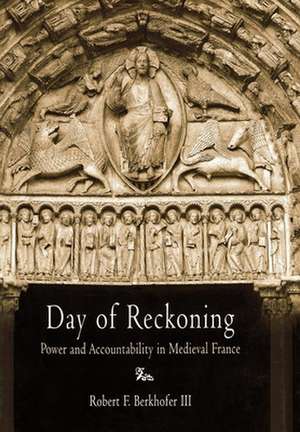Day of Reckoning – Power and Accountability in Medieval France: The Middle Ages Series
Autor Robert F. Berkh Iiien Limba Engleză Hardback – 11 mai 2004
Din seria The Middle Ages Series
-
 Preț: 195.13 lei
Preț: 195.13 lei -
 Preț: 192.05 lei
Preț: 192.05 lei -
 Preț: 281.27 lei
Preț: 281.27 lei -
 Preț: 199.23 lei
Preț: 199.23 lei -
 Preț: 198.22 lei
Preț: 198.22 lei -
 Preț: 240.85 lei
Preț: 240.85 lei -
 Preț: 192.05 lei
Preț: 192.05 lei - 19%
 Preț: 509.33 lei
Preț: 509.33 lei -
 Preț: 245.45 lei
Preț: 245.45 lei -
 Preț: 232.87 lei
Preț: 232.87 lei -
 Preț: 286.76 lei
Preț: 286.76 lei -
 Preț: 192.05 lei
Preț: 192.05 lei -
 Preț: 247.43 lei
Preț: 247.43 lei -
 Preț: 231.78 lei
Preț: 231.78 lei -
 Preț: 193.04 lei
Preț: 193.04 lei -
 Preț: 191.00 lei
Preț: 191.00 lei -
 Preț: 216.43 lei
Preț: 216.43 lei -
 Preț: 267.27 lei
Preț: 267.27 lei -
 Preț: 285.64 lei
Preț: 285.64 lei -
 Preț: 285.64 lei
Preț: 285.64 lei -
 Preț: 248.56 lei
Preț: 248.56 lei -
 Preț: 323.44 lei
Preț: 323.44 lei -
 Preț: 197.18 lei
Preț: 197.18 lei -
 Preț: 230.41 lei
Preț: 230.41 lei -
 Preț: 243.06 lei
Preț: 243.06 lei -
 Preț: 154.43 lei
Preț: 154.43 lei -
 Preț: 191.00 lei
Preț: 191.00 lei -
 Preț: 317.31 lei
Preț: 317.31 lei -
 Preț: 406.68 lei
Preț: 406.68 lei - 19%
 Preț: 446.65 lei
Preț: 446.65 lei -
 Preț: 183.69 lei
Preț: 183.69 lei -
 Preț: 285.88 lei
Preț: 285.88 lei - 19%
 Preț: 363.86 lei
Preț: 363.86 lei -
 Preț: 216.36 lei
Preț: 216.36 lei -
 Preț: 290.05 lei
Preț: 290.05 lei - 19%
 Preț: 420.72 lei
Preț: 420.72 lei - 23%
 Preț: 538.83 lei
Preț: 538.83 lei -
 Preț: 458.15 lei
Preț: 458.15 lei - 30%
 Preț: 406.56 lei
Preț: 406.56 lei -
 Preț: 232.58 lei
Preț: 232.58 lei - 19%
 Preț: 365.58 lei
Preț: 365.58 lei -
 Preț: 198.22 lei
Preț: 198.22 lei -
 Preț: 322.52 lei
Preț: 322.52 lei -
 Preț: 174.65 lei
Preț: 174.65 lei -
 Preț: 405.32 lei
Preț: 405.32 lei -
 Preț: 243.06 lei
Preț: 243.06 lei -
 Preț: 428.40 lei
Preț: 428.40 lei - 19%
 Preț: 415.73 lei
Preț: 415.73 lei -
 Preț: 239.77 lei
Preț: 239.77 lei
Preț: 443.59 lei
Preț vechi: 498.41 lei
-11% Nou
Puncte Express: 665
Preț estimativ în valută:
84.88€ • 88.85$ • 70.65£
84.88€ • 88.85$ • 70.65£
Carte tipărită la comandă
Livrare economică 31 martie-14 aprilie
Preluare comenzi: 021 569.72.76
Specificații
ISBN-13: 9780812237962
ISBN-10: 081223796X
Pagini: 280
Ilustrații: 1
Dimensiuni: 152 x 229 x 15 mm
Greutate: 0.54 kg
Ediția:New.
Editura: MT – University of Pennsylvania Press
Seria The Middle Ages Series
ISBN-10: 081223796X
Pagini: 280
Ilustrații: 1
Dimensiuni: 152 x 229 x 15 mm
Greutate: 0.54 kg
Ediția:New.
Editura: MT – University of Pennsylvania Press
Seria The Middle Ages Series
Cuprins
Introduction
1. A Fragmentary Past? Monastic History, Memory, and Patrimony
2. Written Comprehension of Land and Signs of an Administrative Mentality
3. Ministering and Administering: Abbots as Catalysts of Change
4. Discipline and Service Inside and Outside the Cloister
Conclusion: Accountability, Writing, and Rule by 1200
Appendix 1: The Cartularies of Saint-Bertin
Appendix 2: The Cartulary of Three Crosses
Appendix 3: Enumerations in Papal Confirmations
Appendix 4: Abbatial and Monastic Acts: Saint-Vaast, Saint-Bertin, and Saint-Denis
List of Abbreviations
Notes
Bibliography
Index
Acknowledgments












